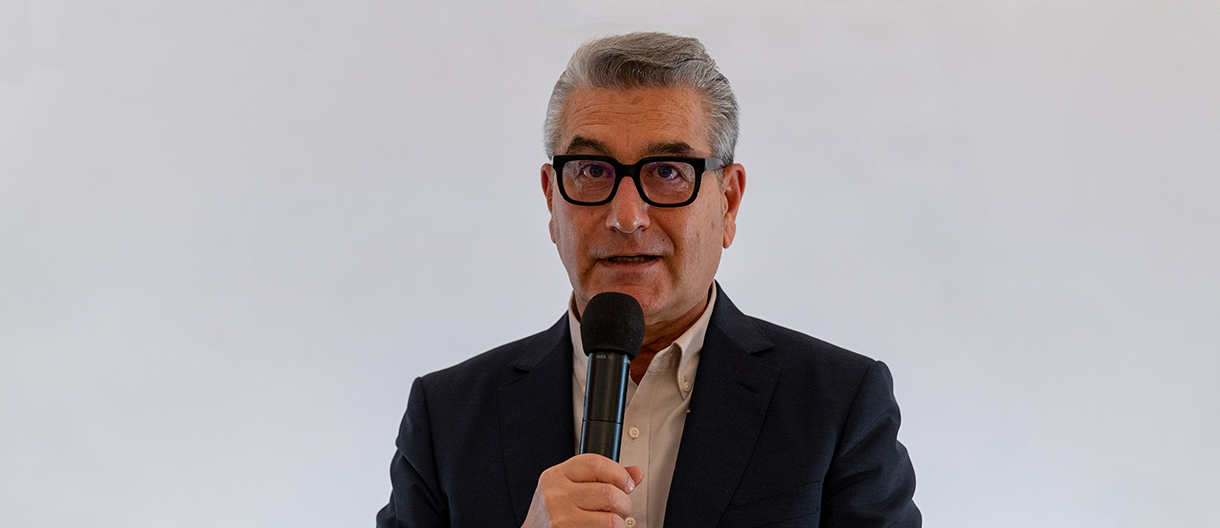
Leadership Talks – Paolo Palomba, The Future of Food and Beverage Distribution After the Pandemic
13 December 2021Paolo Palomba, Partner, IPLC Europe – The Retailer Brand Specialist, held the first meeting of the Leadership Talks series talking about safety and sustainability and sharing his personal experiences in the Food & Wine supply chain with the participants of the Global MBA.
Palomba began by explaining that we do not know exactly what shape the sector will take in the post-pandemic, given that we are still in a phase of uncertainty. Still, it is necessary to remain optimistic and remember that the key to the future of Agri-Food is a sustainable and resource-friendly approach.
In a flashback of a couple of years ago, Palomba recalled how the pandemic crisis was born and how it evolved. It all started from a distant and unknown place, such as the Chinese city of Wuhan but it soon impacted the habits of consumers, who found themselves buying the initially unavailable masks and wearing them for daily activities as they never thought they should do. The pandemic immediately had an impact also on large retailers, which had to adapt to the new rules for the prevention of contagion. Just think of how the way of shopping has changed, with distancing and long queues outside the main supermarkets.
Retracing the history of the pandemic from a personal and professional point of view, Palomba recalled how he had been asked by many contacts abroad what could be a sort of Italian “vademecum” for the management of the emergency in his own sector. An “Italian Download” to be used as an exemplary package for other countries. Italy, however, was not immediately a model: not a few foreign colleagues, Palomba said, were surprised by the lockdown and security measures, considered excessive, adopted in our country. Today it is evident how necessary those are and today we can also see what impact those events have on retail, which had to manage not only consumers in the stores, but also employees and communications in a completely unexpected way.
In full lockdown, the Grocery supply chain remained, in fact, at work, in a completely new context which included, among other things, controls for spacing, mandatory masks and gloves for workers and measures related to bonuses and incentives to limit absenteeism. The pressure on retailers was impressive, from the calculations to understand how many people could enter the store, to the correct management of safety and personnel.They had to completely reinvent the whole distribution, management and promotion scheme, also considering the impact on consumers. In fact, things changed also from the point of view of purchasing choices: from stocks made by the most provident, to compulsive purchases dictated by panic, in search of new solutions to not physically go shopping. We have also seen new forms of solidarity that have prompted retailers to support local producers, make free deliveries, donate food to those in difficulty and freeze prices despite the situation could have justified their increase. Another key element for large-scale distribution was technology: not only online shopping, but also new apps to know in real time how many people were queuing in front of each store. The week from 9 to 15 March then represented a real record: an exponential increase in sales against a net decrease in promotional activities.
All these experiences today outline a post-pandemic scenario in which, first of all, it is necessary to rediscover and focus on two fundamental themes: that of health and safety and that of sustainability, from every point of view. Just think about the use of disposable masks and the need to have a greater amount of packaging, in order to make the products on sale safer. Indicating a more sustainable approach as the only possible solution to continue to meet the needs of the market without penalizing the environment, Palomba provided numbers and keywords to understand the impact of the Agri-Food supply chain on the environment, explaining how it is responsible for at least one third of the emission of greenhouse gases into the atmosphere and for how 38% of the food produced is wasted at different stages of the chain. Afterwards, Palomba showed a series of best practices that give hope and show that the sector is ready for a positive turnaround. The actions taken by major retailers on the part of the environment and health, which are clearly growing, point towards a certain optimism. Optimism which is also part of Palomba’s personal approach to the world of wine retail, for which the reduction of environmental impact is still a fundamental issue, inviting participants to collaboration and transparency.
Palomba’s talk is part of a series of meetings with top managers and opinion leaders aimed at introducing Global MBA students to specific knowledge, showing relevant insights on the challenges that global organizations will have to face in the near future, in view of a post-pandemic scenario in constant evolution. The experience of professionals involved helps our participants to identify trends, skills and strategies useful for companies, managing the request for a more sustainable and equitable future in the automotive, food and wine, fashion and energy.
